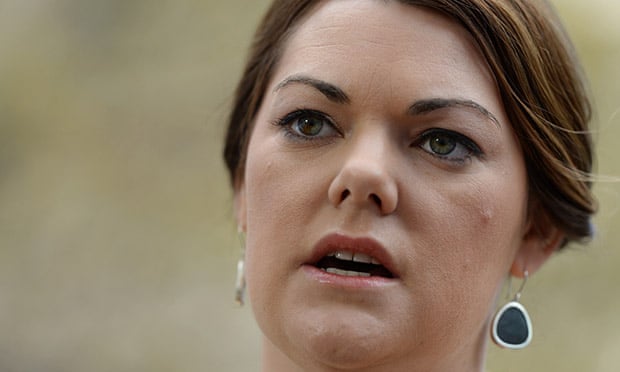Paul Farrell Thursday 22 January 2015
Labor and Australian Greens respond to revelations journalists reporting on immigration issues were referred to police in a bid to identify their sources
Australian Greens spokesperson for immigration Sarah Hanson-Young has said she will move for greater access to detention centres. Photograph: Lukas Coch/AAP
Labor and the Greens have expressed serious concern about federal government agencies asking police to investigate confidential sources and whistle-blowers over reports about asylum seekers.
On Thursday Guardian Australia revealed journalists reporting on asylum-seeker policies have been repeatedly referred to the police in attempts to uncover sources.
Greens senator Sarah Hanson-Young said she would move for greater access to detention centres when parliament resumed, and described the referral of journalists to the federal police as an “appalling act”.
Journalists reporting on asylum seekers referred to Australian police
Exclusive: Journalists covering the Australian government’s asylum seeker policies are repeatedly reported to federal police in bid to uncover sources
“The only insurance the public has against this government’s secrecy is granting journalists access to the detention centres and giving those inside the protection to speak freely,” she said.
“That is why when parliament resumes I will be moving for the media to have access to all Australian-funded detention centres and will move to provide protections to people inside to speak freely about what is really happening behind the gates.”
Labor’s acting immigration spokesman, Matt Thistlethwaite, said the reports were “extremely concerning”.
“This government has a woeful track record when it comes to being upfront with the Australian people,” he said. “This irrational secrecy at any cost behaviour leads us to ask what on earth is this government trying to hide?
“We are simply left with more questions than answers.”
The previous Labor government introduced a media access deed that allowed journalists to visit detention centres under the supervision of immigration staff. But since the Coalition was elected in September 2013, no journalists has been granted access to an Australian detention centre.
Australia has strict laws surrounding leaks of government information, and the Australian Law Reform Commission has previously recommended they be narrowed.
Reporters have been unable to visit the Manus Island detention centre, where hunger strikes and protests have now lasted more than a week.
Australian Lawyers Alliance spokesman Greg Barns told Guardian Australia the report showed the government was trying to intimidate journalists.
“It’s notorious that the AFP does not like to spend its time and limited resources on investigating leaks from Canberra. One, because they never result in a prosecution; and two, because they’re resources intensive” he said.
“There’s a clear pattern here emerging where the government is adopting a Nixon White House strategy of seeking to intimidate journalists who are reporting on what is going on Australia’s immigration detention network.”
The AFP have refused to confirm or deny whether authorisation has been given for any journalists’ phone or web records to accessed.
Manus Island: two more hunger-strikers reportedly swallow razor blades
Several hundred men remain on hunger strike across the Australian-run detention centre as protests continue for eighth day
On Thursday the attorney general’s department said journalists and their sources should not be entitled to privileged communication that would prevent or impose limits on the government’s access to metadata.
In a submission to the joint parliamentary committee on intelligence and security inquiry into the government’s plan to store web and phone data for two years, the department said it rejected arguments that any “special status” should be afforded to particular powers.
“Disclosures of data are available to support the enforcement of the criminal law, administration of pecuniary penalties and the protection of the public revenue,” the submission said. “It is not appropriate to afford a special status to particular types of communications as powers of this type should, by their nature, be applied generally.”
The department argued though that “telecommunications data would not be available” for certain types of whistle-blowers who made disclosures under the Public Interest Disclosure regime set up by the Labor government in 2013.
But these disclosures would not encompass leaks to journalists, and would only relate to a limited range of internal disclosures to government agencies and oversight bodies.




